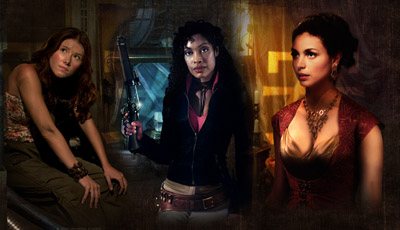BitDepth 497 - November 01
11/01/09 17:44 Filed in: BitDepth - November 2005
Joss Whedon ends his space cowboy saga with bravura style.
Whedon’s space opera finds closure

Serenity’s space hotties, engineer Kaylee (Jewel Staite), warrior Zoe (Gina Torres) and galactic geisha Inara (Morena Baccarin).
I was predisposed to steer clear of Joss Whedon’s Firefly television series back in 2002, having acquired no taste for his wisecracking, cursed teens in Buffy the Vampire Slayer and Angel.
Enlightenment came when the Sci Fi channel wedged it into the Stargate-Battlestar Galactica Friday lineup as a surprise aperitif.
I didn’t start watching the show, really, it crept up on me; one mistimed start to my evening’s viewing after another. On television, Firefly turned out to be quite infectious, if somewhat confusing if you keep tuning in at the end or in the middle.
Eventually, I just started my SciFriday an hour earlier and found the series, just a short 14 episodes, to be even better than I’d thought.
Set five hundred years in the future in a universe in which the dominant cultures have turned out to be American and Chinese in almost equal parts and humanity has spread out to other planets, Mal (Nathan Fillion) and his distinctly motley crew flit about on the edges of a frontier-like civilised space engaged in activities in a grey area of morality.
Mal’s scrappy cowhand style of dressing, the casual mess of his ship and his need to be an independent loner with patient friends seem quite similar to another famous Corellian smuggler, but if that guy ended up in a universe of stark good and evil, the Serenity took a wrong turn and found itself running up against a benevolent, overly controlling Alliance that never seemed to be clearly bad.
Aboard the ship, a small Firefly model named Serenity, are a priest and a high-priced space “companion,” a quick-tempered Baldwin named Jayne and two mysterious passengers Simon Tam (Sean Maher) and his distinctly flaky sister River (Summer Glau).
While Simon got to be a quietly surly doctor, River spent most of the 14 episodes looking inexplicably loony, an unhappy result of the short run of the show and Whedon’s wordy, plot driven stories.
So Whedon took his 119 minutes worth of film, Serenity, to set things right once and for all.
The movie looks much better than the television series ever could, beginning with a long tracking shot that goes from the ship’s front window right through to the engine room.
There are huge space battles, great fight scenes and a powerful score from David Newman that builds on the folksy title song that acted as such a curious counterpoint to the TV show instead of just replacing it.
There are two big themes in Serenity; “can’t stop the signal” which is both the film’s story about revealing a difficult truth and a fanboy reference to the groundswell movement that took Firefly from failed TV series to DVD to film that rides close to the idea that every great civilisation is built on the bones of its dead.
From that you may infer that the immortality that accompanies actor’s contracts on a television show has been lifted in this incarnation of the battered Firefly’s journey.
River has a lot to do with this and her promotion from weirdo with premonitions to co-star and action hero is one of Whedon’s bravest and most intelligent touches. It’s as if the first Star Trek film had been plotted around Yeoman Janice Rand.
Familiar faces die in Whedon’s big screen Serenity, and they die because while Mal always tried to do the right thing on the small screen, in the film he takes on “the man” and meets an implacable opponent, the serenely deadly Operative (Chiwetel Ejiofor).
What ensues is some of the most thoughtful, romantic and engaging space opera on film since The Empire Strikes Back. Serenity is worth seeing even if you don’t particularly care for real men in space, but it has even more resonance if you catch a few episodes of the original show first.

Serenity’s space hotties, engineer Kaylee (Jewel Staite), warrior Zoe (Gina Torres) and galactic geisha Inara (Morena Baccarin).
I was predisposed to steer clear of Joss Whedon’s Firefly television series back in 2002, having acquired no taste for his wisecracking, cursed teens in Buffy the Vampire Slayer and Angel.
Enlightenment came when the Sci Fi channel wedged it into the Stargate-Battlestar Galactica Friday lineup as a surprise aperitif.
I didn’t start watching the show, really, it crept up on me; one mistimed start to my evening’s viewing after another. On television, Firefly turned out to be quite infectious, if somewhat confusing if you keep tuning in at the end or in the middle.
Eventually, I just started my SciFriday an hour earlier and found the series, just a short 14 episodes, to be even better than I’d thought.
Set five hundred years in the future in a universe in which the dominant cultures have turned out to be American and Chinese in almost equal parts and humanity has spread out to other planets, Mal (Nathan Fillion) and his distinctly motley crew flit about on the edges of a frontier-like civilised space engaged in activities in a grey area of morality.
Mal’s scrappy cowhand style of dressing, the casual mess of his ship and his need to be an independent loner with patient friends seem quite similar to another famous Corellian smuggler, but if that guy ended up in a universe of stark good and evil, the Serenity took a wrong turn and found itself running up against a benevolent, overly controlling Alliance that never seemed to be clearly bad.
Aboard the ship, a small Firefly model named Serenity, are a priest and a high-priced space “companion,” a quick-tempered Baldwin named Jayne and two mysterious passengers Simon Tam (Sean Maher) and his distinctly flaky sister River (Summer Glau).
While Simon got to be a quietly surly doctor, River spent most of the 14 episodes looking inexplicably loony, an unhappy result of the short run of the show and Whedon’s wordy, plot driven stories.
So Whedon took his 119 minutes worth of film, Serenity, to set things right once and for all.
The movie looks much better than the television series ever could, beginning with a long tracking shot that goes from the ship’s front window right through to the engine room.
There are huge space battles, great fight scenes and a powerful score from David Newman that builds on the folksy title song that acted as such a curious counterpoint to the TV show instead of just replacing it.
There are two big themes in Serenity; “can’t stop the signal” which is both the film’s story about revealing a difficult truth and a fanboy reference to the groundswell movement that took Firefly from failed TV series to DVD to film that rides close to the idea that every great civilisation is built on the bones of its dead.
From that you may infer that the immortality that accompanies actor’s contracts on a television show has been lifted in this incarnation of the battered Firefly’s journey.
River has a lot to do with this and her promotion from weirdo with premonitions to co-star and action hero is one of Whedon’s bravest and most intelligent touches. It’s as if the first Star Trek film had been plotted around Yeoman Janice Rand.
Familiar faces die in Whedon’s big screen Serenity, and they die because while Mal always tried to do the right thing on the small screen, in the film he takes on “the man” and meets an implacable opponent, the serenely deadly Operative (Chiwetel Ejiofor).
What ensues is some of the most thoughtful, romantic and engaging space opera on film since The Empire Strikes Back. Serenity is worth seeing even if you don’t particularly care for real men in space, but it has even more resonance if you catch a few episodes of the original show first.
blog comments powered by Disqus

